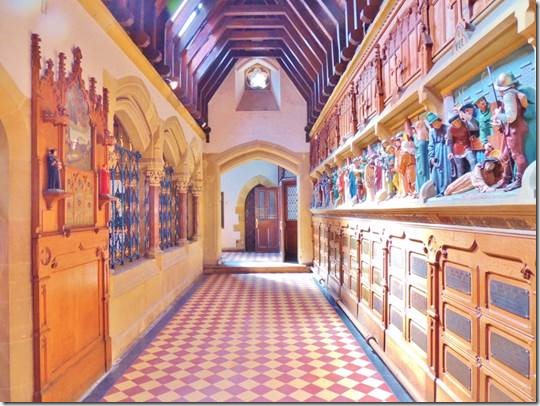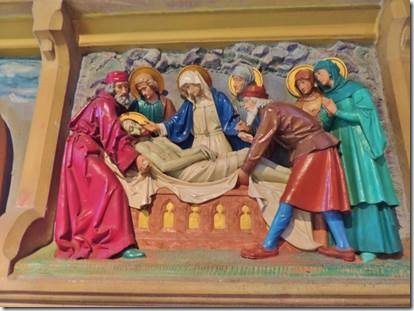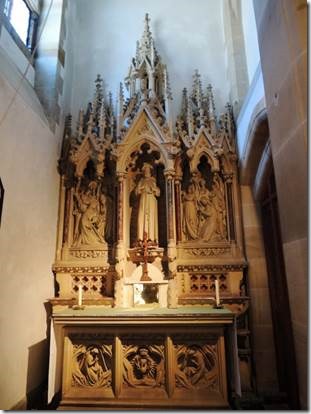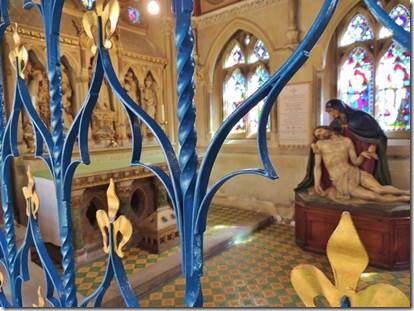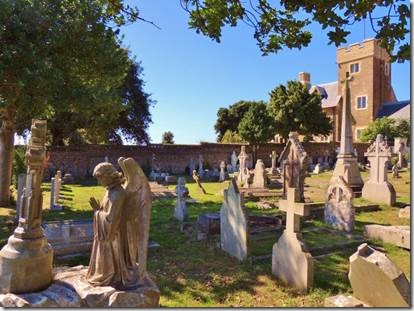Queensborough Harbour tiny concrete barge
Creek, off the Medway River, of the Thames
Hi All,
Tomorrow we’ll be in St. Katherine’s Dock! We left Ramsgate this morning at 5:55 AM and turned off the engine today at 12:20 PM. The first part was of the passage was bumpy but then when we turned into the Thames it smoothed out. It’s a tricky passage so Randal did all of the driving. We are stopped here overnight because the locks to St. Katherine’s open with the tide and tomorrow that well be between 10:40 AM and 2:20 PM, too far from Ramsgate to arrive on time. It was 36 miles from Ramsgate to Queensborough and it’s 44.7 miles from here to St. Kats with twists and turns and traffic and tides so Randal wants to allow for plenty of time. We plan to leave at daylight to give ourselves plenty of time.
Thanks to the advice of some folks we met in Eastbourne we knew not to use a mooring ball here: we’re too heavy. So the kind men from Greensborough Harbour told us to tie up to this stationary barge for the night and they motored out to catch our lines as we’re in the middle of the creek. £12 fee is well worth the peace of mind. They offer a water taxi service to shore but we’ll just rest on the boat and have an early night. www.queensborough-harbour.co.uk is their site. Our 3G dongles provide Internet connection as we travel.
Ramsgate was lovely and spending only one day is a shame. I am especially irked with myself for missing the Montefiore Mausoleum.
“Many people fail to distinguish the achievements of Lady Judith Montefiore from those of her husband Sir Moses Montefiore (1784–1885), who was probably one of the most important Jews of the nineteenth century. Nonetheless, the life of this “First Lady of Anglo Jewry” is of significance both to Anglo-Jewish history and to the history of Jewish women. While embodying all the Victorian virtues of high moral purpose, sense of duty, charity and public–mindedness, she was a fierce loyalist to her faith and her people, devoted to Jewish causes and the welfare of Jews the world over.” http://jwa.org/
http://www.jtrails.org.uk/ is a Jewish Heritage Trail around Ramsgate.
As it was I was pretty tired by the end of our one day. Randal actually returned to the boat before me following our failed attempt to visit St. Augustine’s Church designed by one of Britain’s foremost architects. More about that in next email. I went back to the Town Centre to buy some produce but also found a lovely shop called BonMarche and bought 3 lightweight pullover “jumpers” or sweaters in the US. Most of my clothes are warm weather and after years of drying in the hot tropical sun, have seen their better days. Now all I need are some flannel lined jeans and I’ll be all set.
So now we sit and relax. The Harbour guys told us they might have to raft a boat to us if things got crowded which will make it interesting when we leave at daylight. So we’ll see what happens.
Ru
Ps I may have confused some of you with the photo of the fuel tanks. We have access to them under the floor in the saloon. They certainly piqued the interest of the French Customs guys but didn’t ask Randal to open them. The tanks are actually filled from outside the boat. The fuel goes into the opening with the red lid and it goes down a long filler pipe that is also the decorative pole that hold up the table in our saloon. The fuel tank access is red to insure you don’t mix it up with your water tanks and to make it really noticeable…at least that’s my guess. Randal has a manifold under the floor so he can direct the fuel into each tank to keep the boat level.
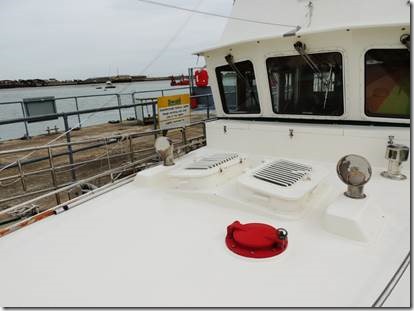
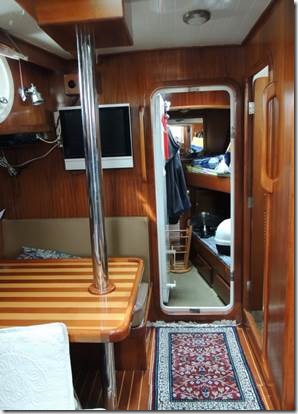
Ramsgate…..
http://www.ramsgatetown.org/
Interesting Facts about Ramsgate
Ramsgate began as a fishing and farming hamlet. Its earliest reference is in the Kent Hundred Rolls of 1274-5 as ‘Ramisgate’ or ‘Remmesgate’ from Anglo-Saxon"Hræfn’s geat", or "raven’s cliff gap", later to be rendered ‘Ramesgate’ from 1357.
In 449AD the Vikings landed and settled in Ramsgate. You can see the Viking ship Hugin at nearby Cliffsend.
In 497AD, England’s first Christian missionary St Augustine landed in Ramsgate. St Augustine’s Cross, which marks the event, is to be found just west of Cliffsend, while the church bearing his name, designed by celebrated architect Augustus Pugin, is situated on the town’s Westcliff.
Ramsgate was a main embarkation port from the UK during the Napoleonic Wars. On one occasion 40,000 troops embarked from the town.
In 1821 King George IV named our harbour ‘Royal’, making it the only Royal Harbour in the UK.
Ramsgate, during the First World War, was branded as the most bombed seaside town in the UK.
Ramsgate was a major contributor towards the rescue of the troops from the Dunkirk Beaches, during World War Two. Assisted by the Sundowner. http://www.ramsgatetown.org/history/sundowner.aspx
Ramsgate, during the Second World War, protected the residents within the underground tunnels, which are nearly 4 miles long, with a capacity to hold 60,000 people. Ramsgate is unique in the world for having these tunnels.
The first international Hoverport in the world was at Pegwell Bay in Ramsgate.
http://www.kent-life.co.uk/ a great walking tour of Ramsgate.
More interesting Ramsgate sites
http://oldramsgate.blogspot.co.uk/
http://www.rtyc.com/
http://www.thanet.gov.uk/
http://www.ramsgate-society.org.uk/
|
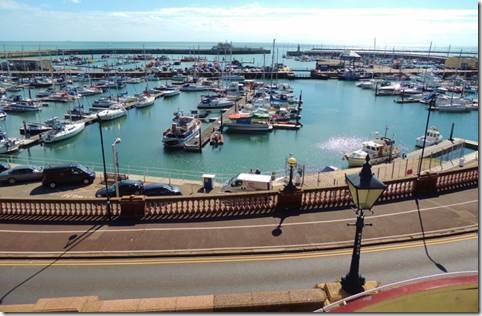
Ramsgate Royal Harbour
Entrance in the background and the one lock into the inner harbour visible with the walkway over it. We were in the outer harbour as we were just staying a short time.
|
|
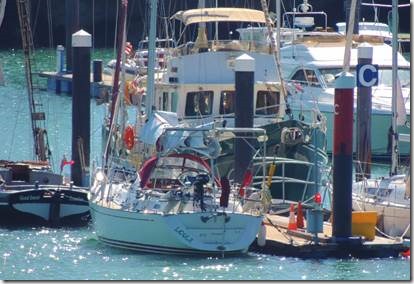
DoraMac on C Pontoon in the Outer Harbour : photo taken from the Royal Yacht Club patio where we ate lunch
|
|
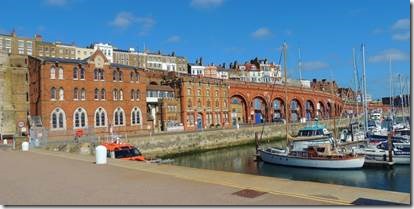
http://gohistoric.com/places/terracing-arcading-balustrades-royal-parade-ramsgate
Not sure really the original use of this area was, but now there are shops along the way. In one on the lower end could barely stand upright.
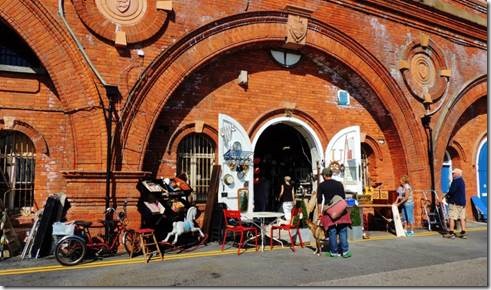
A second-hand boat/curio shop.
|
|
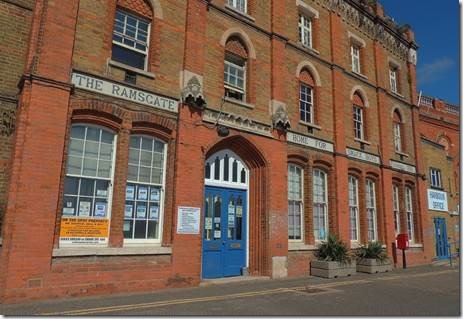
Ramsgate Home for Smack Boys
Former Smack Boys’ Home – Military Road, Ramsgate CT11 9HA.
“Ramsgate was a smack harbour.
The term smack probably was derived from the Dutch word ‘Smak’, a name given to a single fore and aft rigged vessel in the early 18th century.
The dangerous long boom was cut short and a second mast, a mizzen mast, was adopted around the mid 1860’s.” http://www.ramsgatehistory.com/
“the Victorian “Smack Boys Home” (which housed workhouse youngsters farmed out to work the fishing smacks when Ramsgate had a fishing fleet).”
http://www.visitmyharbour.com/articles/2337/ramsgate
“The Smack Boy’s Home was built in 1881 of stock brick and is a Grade II listed building. The smack boys were apprenticed to the fishing smack skippers of Ramsgate (often the other 4 members of the crew besides the skipper himself were all smack boys), there were 50 registered smacks here in 1863, 168 in 1906. The home was the result of pressure put on the Board of Trade by Canon Brenan, Vicar of Christ Church, Ramsgate. No other British fishing port appears to have copied this unique facility. http://www.thanet.gov.uk/
“My great grandfather, born in 1862, an orphan, came to Ramsgate from Luton. In all probability he would have used the Smack Boys Home at some time. He being a crew member on one of Ramsgate’s fishing boats. He met and married my great grandmother who worked in the fishmarket on the crosswall.”
“As mentioned earlier, my grandfather was also an orphan and was housed in the Smack Boys Home. We have never been able to find out where he originally came from, maybe because his name, John Saunders is quite common and is shown on the plaque in the church as being one of the crew lost on the Campanula.”
http://www.ramsgatehistory.com/forum/index.php?topic=541.0
|
|
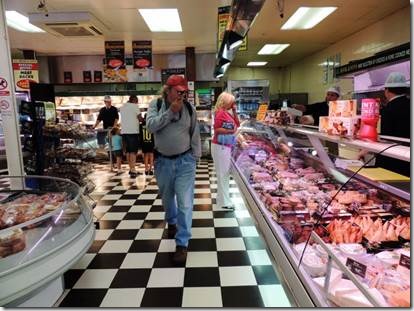
Mouthwatering aromas from this place: had to remind ourselves that we were to have lunch at the Yacht Club!
|
|
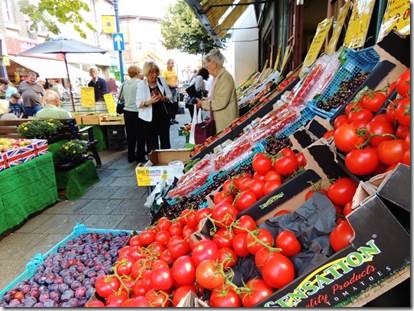
Fruit and veggies
Later in the day I bought melon and bananas.
Ramsgate Market
Situated in the pedestrianised areas of the Town centre just off the seafront – High Street , King Street and Queen Street and Cavendish Street. Ramsgate. CT11 9AG
Held every Friday and Saturday between 9a.m – 4p.m.
One of the county’s largest weekly markets – Flowers and jewellery to pegs and pans, children’s clothes to sportswear, shellfish and food.
To find out more call the market operator: Hughmark International
Tel: 0118-945-1799 Fax: 0118-945-2390
|
|
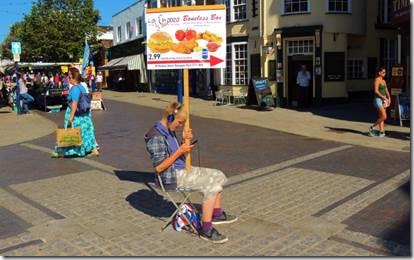
I guess there are worse jobs, though I would imagine your arm would get tired.
|
|
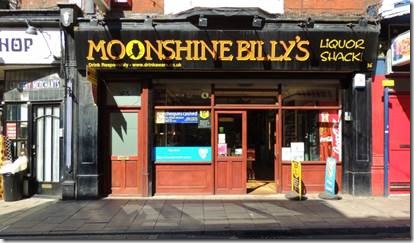
I thought moonshine was an American thang, but the term originated in England.
“The word "moonshine" is generally assumed to have originated in the USA, meaning whiskey illegally made by moonlight. Because the activity of distilling illegal whiskey was usually done at night under the light of the moon, the word became both a verb, meaning making the liquor, and a noun, meaning the liquor that was made. However, the word was also used in eighteenth century England to describe brandy illegally smuggled in by moonlight as in the story of the "moonrakers." Moonshine can also mean "foolish talk," because of the belief that the moon can alter mental states. For whatever reason, there seems to be a poetic connection between the moon and alcohol.
http://www.palmettomoonshine.com/history.php
|
|
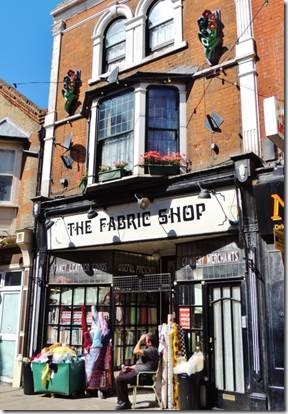
So cute with the ceramic flower bouquets
|
|
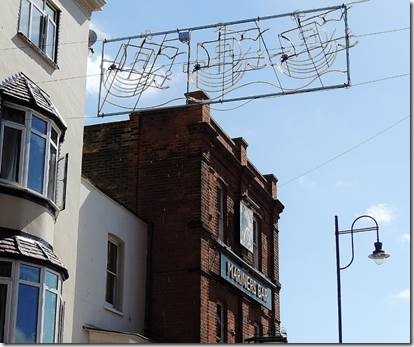
Everything says this is a harbour town
Mariners Bar http://www.marinersbar.co.uk/ (We didn’t eat here but when I looked at the website a funny line about a propeller caught my eye.)
“Jason, a local fisherman for 25 years and former joint founder of the award winning Fishmongers and Restaurant Eddie Gilbert’s, with his fiancé Nicola has recently started a new venture at the Mariners Bar. Formally known as the Harveys Crab and Oyster Bar on Ramsgate Royal Harbour.
Jason has extensively restored the building to it’s former glory with lovely arched and stained glass windows over looking the harbour. The bar area is decorated with treasures he has caught fishing, one of which is a very impressive aircraft propeller hanging from the ceiling. A restored old ramsgate clinker fishing boat hangs either side of the working fireplace
A bar menu is available with locally caught fish by the landlord himself !”
|
|
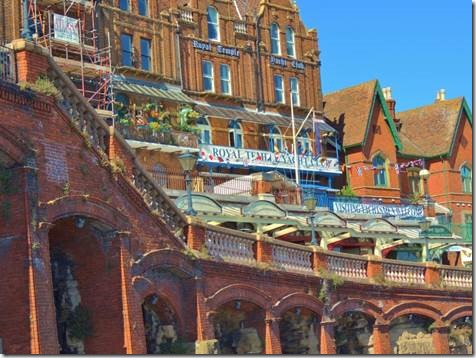
Royal Temple Yacht Club
http://www.rtyc.com/content/history%20of%20rtyc
|
|
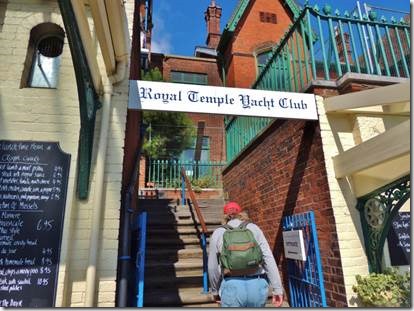
|
|
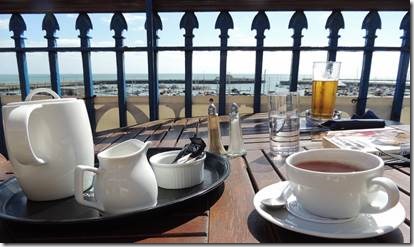
I had a bacon, brie, cranberry baguette with salad and “chips” and a pot of tea.
|
|
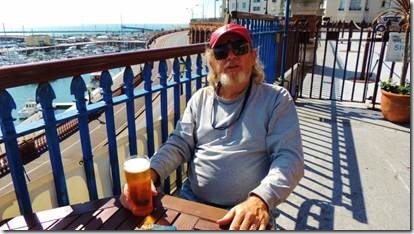
Randal had smoked mackerel, salad, brown bread and my “chips” with his pint of COLD light beer.
|
|
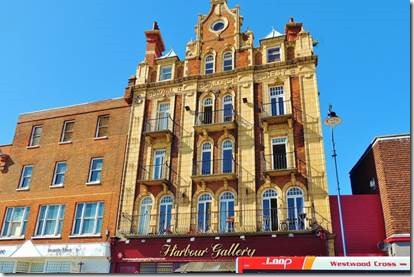
Royal Sailors’ Rest
“Agnes Elizabeth Weston was born in London in 1840. In 1845 the family moved to Bath where Agnes was active as a speaker in the temperance movement. She started a coffee bar in Bath for the men of the local Militia. Agnes wrote to many of the soldiers when they were serving elsewhere and it was this correspondence that brought about her later work.
Early in 1873 many of her naval correspondents were paid-off and Agnes journeyed down to De-vonport to see them. She started to work there for the Royal Naval Temperance Society. She vis-ited the ships and spoke directly to the sail-ors. She was so successful that in the following year, 1874, a deputation from HMS Dryad asked her to open a temperance house close to the Dockyard gate.
In May 1876 enough funds had been raised to open the first Sailors’ Rest in Devonport which was both a restaurant and a hostel, where the rooms were called "cabins". Although intended as a temperance house for the promotion of the movement, all sailors were welcome to make use of the facilities. There was a Royal Sailors‟ Rest in Harbour Pa-rade, Ramsgate facing the harbour. Now flats, the lettering on the façade of the building indicating its former use is still clearly visible.
http://www.ramsgate-society.org.uk/archive/about-ramsgate-summer-2009.pdf
|
|
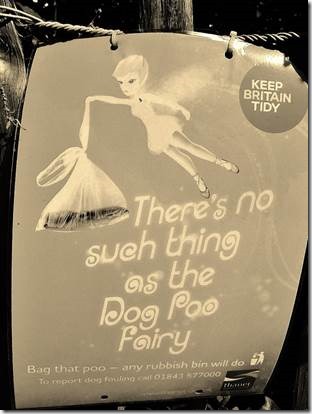
Dog Poo Fairy
This poster was on the fence of a lovely neighborhood green : There’s no such thing as the Dog Poo Fairy. There were bags available for you to clean up after your dog. (The sign was in color but the photo shows up better this way.)
|
|
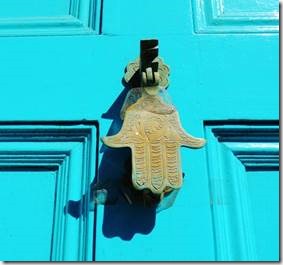 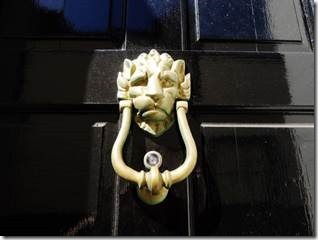
Door knockers
|
|
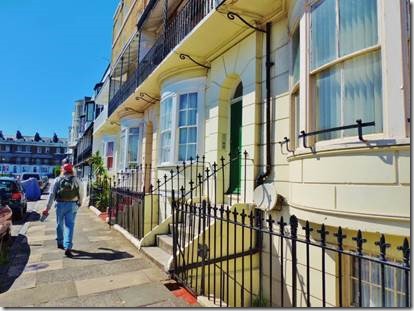
Regular old neighborhood passed on our way to St. Augustine Church
|
|
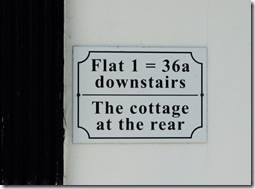 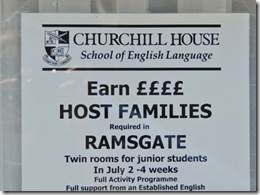
Signs I saw posted in the windows as we passed by.
Apartments are “flats” and $$$$ are ££££ this side of the pond.
|
|
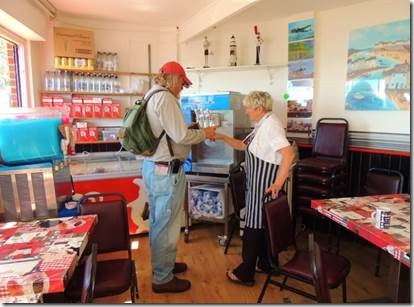
What to do whilst you wait for the church to open.
Small café for some ice cream (Randal) and bottled water (me)
“Whilst : The meaning of everyday words is to be found in the way we use it rather than in the OED or the Internet. By this rationale there are two major differences that spring to mind: first, ‘while’ can be a noun (‘in a while’) whereas ‘whilst’ cannot; second, ‘while’ can mean either ‘during the time when’ or ‘whereas’ while ‘whilst’ has only the first of these meanings.
Peadar Mac Con Aonaigh, Brixton, UK
While Peadar observes that the meaning of words is best derived from the way we use them rather than the OED, it is worth noting that the OED will record how we used them over time, so their contemporary uses, when lost, are still known to those who follow us. Personally, I’ve noted that the use of ‘whilst’ correlates directly and exclusively with being British.
Oliver Mullarney, San Francisco, USA
http://www.theguardian.com/notesandqueries/query/0,5753,-5498,00.html
|
|
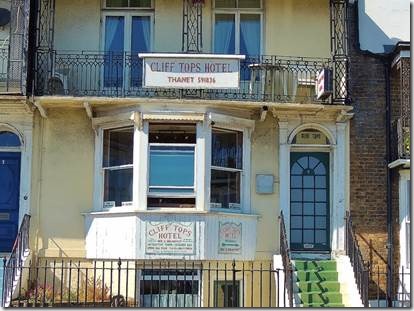
Cliff Tops Hotel; So very seaside
|

